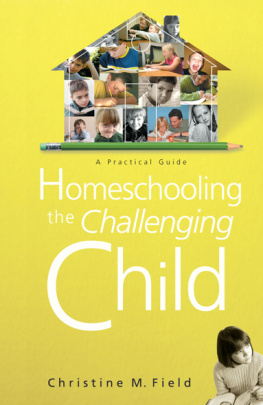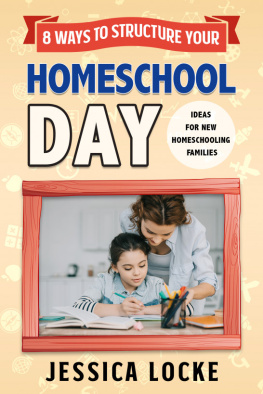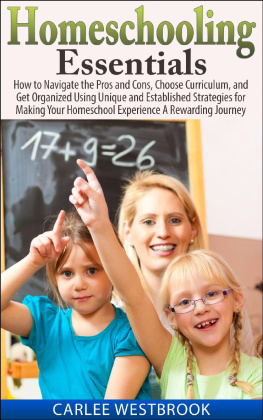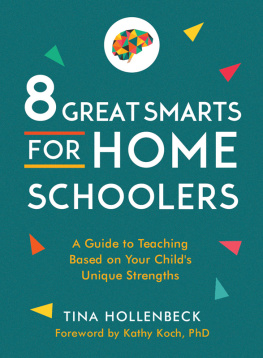Homeschool Cooperatives
Here you can read online Homeschool Cooperatives full text of the book (entire story) in english for free. Download pdf and epub, get meaning, cover and reviews about this ebook. year: 2023, genre: Children. Description of the work, (preface) as well as reviews are available. Best literature library LitArk.com created for fans of good reading and offers a wide selection of genres:
Romance novel
Science fiction
Adventure
Detective
Science
History
Home and family
Prose
Art
Politics
Computer
Non-fiction
Religion
Business
Children
Humor
Choose a favorite category and find really read worthwhile books. Enjoy immersion in the world of imagination, feel the emotions of the characters or learn something new for yourself, make an fascinating discovery.

Homeschool Cooperatives: summary, description and annotation
We offer to read an annotation, description, summary or preface (depends on what the author of the book "Homeschool Cooperatives" wrote himself). If you haven't found the necessary information about the book — write in the comments, we will try to find it.
Unknown: author's other books
Who wrote Homeschool Cooperatives? Find out the surname, the name of the author of the book and a list of all author's works by series.
Homeschool Cooperatives — read online for free the complete book (whole text) full work
Below is the text of the book, divided by pages. System saving the place of the last page read, allows you to conveniently read the book "Homeschool Cooperatives" online for free, without having to search again every time where you left off. Put a bookmark, and you can go to the page where you finished reading at any time.
Font size:
Interval:
Bookmark:


Man is the only creature that refuses to be what he is.
~Albert Camus
Author Acknowledgments
I want to thank Gatee who made the drawing of the snake used on the cover. I used Mathematica and Picsart.com in order to modify it.
Tiffany Dvorak was the main proofreader and her detailed work is highly appreciated.
I learned about Albert Camus after finishing writing this book but before publishing. And while his work was not used to help me form the presented conclusions, it helps me validate what I wrote.
Camus was an absurdist. A requirement from this is that there is no absolute system of universal values. A person can cope with this by committing suicide, adhering to another persons system of values, or becoming an absurd hero.
I believe nature dictates our human values but humans are mostly irrational. And the natural world follows physical laws and there is a god that idealizes a precise set of morals. But words are always ambiguous. And so our human systems are always irrational. The general theme of the methods are to follow the childs needs and dictating them strictly for the purpose of themselves eventually becoming their own absurd hero.
History is interpreted from data. One cannot compress a data file to an arbitrarily small size without losing some data. And it is very possible that there will never be a computer that could solve or store the solution to chess because of the complexity. A chessboard has only 64 squares. The world is more complicated than a chess board. As such, every summary that is readable to a human must necessarily have missing data. So I must add something. History is interpreted from data and opinions resulting from a biased story. With this disclaimer, I commence my propaganda.
Every education reform that actually helped to reform education in a positive light shared two opposing themes.
1. They aimed to spread education to people regardless of social class.
2. They all failed.
The torch of reform is way too complicated to explain or even list out. But for this narration, we concern ourselves with three forces.
The forces are:
- Governments
- Organizations of Worship
- Individual Reformers
Individual reformers were the most altruistic. And perhaps many had very similar visions for an ideal. But they were located in different time periods or different places. When reading their writings, they seem to be working on a different body part of the same elephant. They encouraged democratic thinking, helping the poor, and an admiration of a childs natural curiosity. These include Plato, Comenius, Piaget, Frederick the Great, Joseph Lancaster, Dr. Montessori, Loris Malaguzzi, Horace Mann, John Dewey, Charlotte Mason among many others. I would say that even though they all seem very different, an educational philosophy is naturally impossible to fully explain, and so the overlap is much larger than at first glance. They all seem very similar and on the most correct track. Unfortunately, altruistic reformers typically have the least amount of sway in reform. Governments often hijack these peoples works and incorporate part of it into the public education system. This historically has always led to overall improvements.
All major Organizations of Worship had aimed to increase the morality of their students. Most succeeded. Yeshivas are great. Jesuit universities are great. Gurukuls are great. Mosque-schools are great. A lot of them were great. But many throughout history encouraged authoritarianism and restricted subjects taught. But overall, they were good for society. But unfortunately, they were also often ethnocentric as well. This often caused distress for the communities not actually at the school.
Christian schools are most notorious for causing unintended harm. The Waldorf Method is particularly ethnocentric and has discouraged the use of vaccines which has caused harm. The problems of over emphasis on authority can also be seen with the rampant abuse that had taken place in Ireland, the incapacitation of Native Americans that were deemed useless upon return back to their homes because they were no longer able to hunt or participate in their home community, or rejecting teaching about Evolution, not providing adequate sexual education, or even restricting access to books such as Harry Potter. While Christianity has brought education to all regions of the world, authoritarianism has no place in guiding education. Being authoritative should be done instead.
Governments reform in two ways. In good or stale times, they intentionally make education worse in order to control the populace. When things get bad, like Prussia losing a war badly because of corruption or the space race during the time the U.S. was competing against Russia, we see a rapid improvement in education quality and access. But this improvement is artificial and leads to an unnatural learning environment. Not every child needs to learn Algebra. Government initiatives often lead to bureaucratic perversions of what individual reformers fought for as well as copious amounts of harmful propaganda. Be nice morality is not the same as Bear your cross. Government reforms lead to a disgusting reversal of the morality that Organizations of Worship wrought. An example is in America where children pray to a flag instead of the Creator of the universe.
Globally, for the past several decades, the world has experienced mostly good times. It is important for a long-lasting movement that a permanent international divorce occurs between education and the States. The solution is a styled version of homeschooling cooperatives.
But I will say this. What we currently have in public schools internationally is an abomination. And the only purpose of the didactic Prussian-style is to teach a skill that is high stakes and high complexity. It should not be the main mode of education. It is important to keep in certain situations. Examples are for teaching a student how to use an NMR machine used in chemical analysis or perform a specific surgery. If the NMR machine breaks or a patient dies, an expensive tragedy occurs. A teacher must give clear and detailed explanations followed by students asking pertinent questions. And the student must be able to pass an exam with a satisfactory grade after studying the underlying complex phenomena. But such a method does not lead to a student being able to create a new machine or surgery.
And many private traditional schools are overly elitist. Spoiled children make for horrible students, yet they have the most access to resources which are mostly wasted. And such schools have to put on such a show to look good, such that it often harms the actual quality of education. Grades are often inflated at these private schools. These schools have deals with other institutions that let children go to more elite schools with less work. Also, it is more difficult to maintain order in the class because students cannot be adequately punished for poor behavior. They are also elitist by nature simply by requiring such a high pay wall. This high cost is often due to not being run as a cooperative, but by the same hierarchical structure as public schools but without the same public access.

There are two independent objectives that are under the control of those administering education. And there are three dependent objectives that can be used to guide judgment on how well the independent objectives were administered.
Next pageFont size:
Interval:
Bookmark:
Similar books «Homeschool Cooperatives»
Look at similar books to Homeschool Cooperatives. We have selected literature similar in name and meaning in the hope of providing readers with more options to find new, interesting, not yet read works.
Discussion, reviews of the book Homeschool Cooperatives and just readers' own opinions. Leave your comments, write what you think about the work, its meaning or the main characters. Specify what exactly you liked and what you didn't like, and why you think so.







